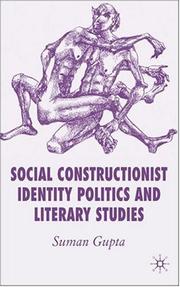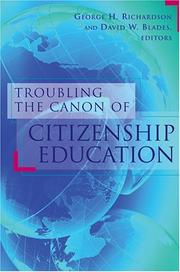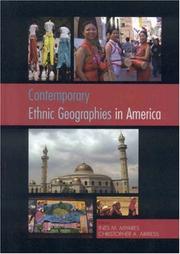| Listing 1 - 10 of 89 | << page >> |
Sort by
|
Book
Year: 1974 Publisher: Montréal, Québec : AUPELF (Association des Universités Partiellement ou Entièrement de Langue Française),
Abstract | Keywords | Export | Availability | Bookmark
 Loading...
Loading...Choose an application
- Reference Manager
- EndNote
- RefWorks (Direct export to RefWorks)
Book
ISBN: 1864484012 Year: 1997 Publisher: London : George Allen & Unwin,
Abstract | Keywords | Export | Availability | Bookmark
 Loading...
Loading...Choose an application
- Reference Manager
- EndNote
- RefWorks (Direct export to RefWorks)
PLURALISME (SCIENCES SOCIALES) --- NATIONALISME --- AUSTRALIE --- PLURALISME (SCIENCES SOCIALES) --- AUSTRALIE --- NATIONALISME --- AUSTRALIE --- AUSTRALIE --- RELATIONS --- ASIE
Book
Publisher: Carlton South, VIC. : Melbourne University Press.
Abstract | Keywords | Export | Availability | Bookmark
 Loading...
Loading...Choose an application
- Reference Manager
- EndNote
- RefWorks (Direct export to RefWorks)
PLURALISME (SCIENCES SOCIALES) --- IMMIGRES --- AUSTRALIE --- AUSTRALIE --- AUSTRALIE --- EMIGRATION ET IMMIGRATION --- PLURALISME (SCIENCES SOCIALES) --- IMMIGRES --- AUSTRALIE --- AUSTRALIE --- AUSTRALIE --- EMIGRATION ET IMMIGRATION

ISBN: 9780230500471 0230500471 1349352640 9786610856961 1280856963 0230801293 Year: 2007 Publisher: Basingstoke Palgrave Macmillan
Abstract | Keywords | Export | Availability | Bookmark
 Loading...
Loading...Choose an application
- Reference Manager
- EndNote
- RefWorks (Direct export to RefWorks)
In this fascinating interdisciplinary study, Suman Gupta argues that while it is widely accepted that essentialist ideas of identity are politically dangerous, certain social constructionist accounts of identity have now come to enjoy extraordinary currency. The latter are often regarded as central to contemporary political occurrences and social/cultural arrangements, particularly in academic institutions. This book explores why these ideas can be problematic, paying attention to both theoretical debates and institutional practices. Gupta first of all examines the conceptual aspect of social constructionist identity politics with regard to the humanities in general, and then considers the role of such politics in literary studies. His book constitutes a timely intervention in the current debate about the future of the humanities.
Sociological theory building --- Literature --- Identité (psychologie) --- Identité collective --- Multiculturalisme --- Identite dans la litterature --- Pluralisme (sciences sociales)
Book
ISBN: 0333571029 Year: 1993 Publisher: Basingstoke Macmillan
Abstract | Keywords | Export | Availability | Bookmark
 Loading...
Loading...Choose an application
- Reference Manager
- EndNote
- RefWorks (Direct export to RefWorks)
Liberalism --- Liberalisme --- Libéralisme --- Pluralism (Social sciences) --- Pluralisme (Sciences sociales) --- Pluralisme (Sociale wetenschappen) --- Tolerantie --- Toleration --- Tolérance --- Verdraagzaamheid
Book
ISBN: 9782708136588 Year: 2006 Publisher: Paris : Ed. d'Organisation,
Abstract | Keywords | Export | Availability | Bookmark
 Loading...
Loading...Choose an application
- Reference Manager
- EndNote
- RefWorks (Direct export to RefWorks)
En s'appuyant sur une étude réalisée auprès d'un panel d'entreprises françaises, grandes et plus modestes, ce livre propose un examen détaillé et approfondi de la question de la diversité dans les entreprises en France. Comment gèrent-elles leurs minorités et pourquoi ont-elles tout intérêt à jouer la carte de la diversité, telles sont les questions auxquelles les auteurs ont tenté de répondre. Cet ouvrage fournira à celles qui ont décidé de s'engager sur cette voie des comparaisons internationales, des pistes de réflexion et des perspectives quant aux pratiques et aux méthodes pour réaliser la diversité dans l'entreprise.
Ressources humaines --- Pluralisme (sciences sociales) --- Multiculturalisme en milieu de travail --- Minorités --- Travail

ISBN: 0820476056 Year: 2006 Publisher: New York : Peter Lang,
Abstract | Keywords | Export | Availability | Bookmark
 Loading...
Loading...Choose an application
- Reference Manager
- EndNote
- RefWorks (Direct export to RefWorks)
Éducation civique --- Citoyenneté --- Éducation --- Pluralisme (sciences sociales) --- Instruction civique --- Étude et enseignement --- buts et enseignement --- Canada --- Éducation civique --- Citoyenneté --- Éducation --- Pluralisme (sciences sociales) --- Instruction civique --- Étude et enseignement --- buts et enseignement --- Canada

ISBN: 3884764527 Year: 2001 Publisher: Trier : WWT Wissenschaftlicher Verlag Trier,
Abstract | Keywords | Export | Availability | Bookmark
 Loading...
Loading...Choose an application
- Reference Manager
- EndNote
- RefWorks (Direct export to RefWorks)
Decolonisation dans la litterature --- Pluralisme (sciences sociales) dans la litterature --- Relations internationales dans la litterature --- Rushdie, Salman --- Decolonisation dans la litterature --- Pluralisme (sciences sociales) dans la litterature --- Relations internationales dans la litterature

ISBN: 9780231134552 Year: 2005 Publisher: New York : Columbia University Press,
Abstract | Keywords | Export | Availability | Bookmark
 Loading...
Loading...Choose an application
- Reference Manager
- EndNote
- RefWorks (Direct export to RefWorks)
In an effort to deny the ongoing effect of colonialism and imperialism on contemporary political life, the death knell for a multicultural society has been sounded from all sides. That’s the provocative argument Paul Gilroy makes in this unorthodox defense of the multiculture. Gilroy’s searing analyses of race, politics, and culture have always remained attentive to the material conditions of black people and the ways in which blacks have defaced the “clean edifice of white supremacy.” In Postcolonial Melancholia, he continues the conversation he began in the landmark study of race and nation 'There Ain’t No Black in the Union Jack’ by once again departing from conventional wisdom to examine—and defend—multiculturalism within the context of the post-9/11 “politics of security.” This book adapts the concept of melancholia from its Freudian origins and applies it not to individual grief but to the social pathology of neoimperialist politics. The melancholic reactions that have obstructed the process of working through the legacy of colonialism are implicated not only in hostility and violence directed at blacks, immigrants, and aliens but in an inability to value the ordinary, unruly multiculture that has evolved organically and unnoticed in urban centers. Drawing on the seminal discussions of race begun by Frantz Fanon, W. E. B. DuBois, and George Orwell, Gilroy crafts a nuanced argument with far-reaching implications. Ultimately, Postcolonial Melancholia goes beyond the idea of mere tolerance to propose that it is possible to celebrate the multiculture and live with otherness without becoming anxious, fearful, or violent.
Pluralisme (sciences sociales) --- Discrimination raciale --- Minorités --- Caractère national anglais --- Grande-Bretagne --- Grande-Bretagne --- Grande-Bretagne --- Pluralisme (sciences sociales) --- Discrimination raciale --- Minorités --- Caractère national anglais --- Grande-Bretagne --- Grande-Bretagne --- Grande-Bretagne

ISBN: 9780742537729 0742537722 Year: 2007 Publisher: Lanham : Rowman & Littlefield,
Abstract | Keywords | Export | Availability | Bookmark
 Loading...
Loading...Choose an application
- Reference Manager
- EndNote
- RefWorks (Direct export to RefWorks)
MINORITÉS --- mutliculturalisme --- Pluralisme (sciences sociales) --- Géographie humaine --- RELATIONS ETHNIQUES --- ETATS-UNIS --- Etats-Unis --- Etats-Unis --- Etats-Unis --- ETATS-UNIS --- MINORITÉS --- mutliculturalisme --- Pluralisme (sciences sociales) --- Géographie humaine --- RELATIONS ETHNIQUES --- ETATS-UNIS --- Etats-Unis --- Etats-Unis --- Etats-Unis --- ETATS-UNIS
| Listing 1 - 10 of 89 | << page >> |
Sort by
|

 Search
Search Feedback
Feedback About UniCat
About UniCat  Help
Help News
News